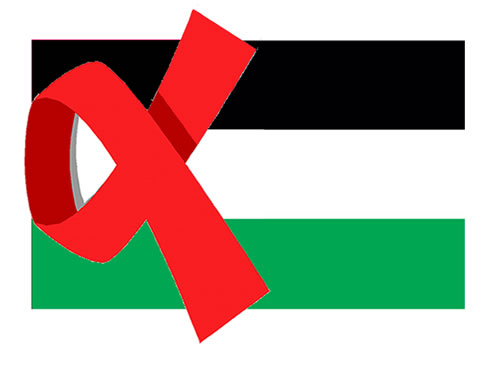Project for the creation of a help line (hotline) to give information
about HIV/AIDS and Sexually Transmitted Diseases (STD)
According to official data, Palestine seems to have a low incidence
in the diffusion of HIV virus amongst its population. Apparently there
are 65 ascertained AIDS cases and about 600 HIV+. In 1995 a free test
was introduced and in 1998 a programme for the control of the virus
diffusion was started in the respect of the international directives.
According to official data, people between 20 and 39 are the most affected
by the disease (62.3%) with a peak of incidence in an age between 30
and 34.
The most affected cities, as far as the population is concerned, are
Jericho (incidence 7.7x100.000 inhabitants), Ramallah (3,12) and Gaza
city, while regarding the absolute number of cases, they are Ramallah
(15.1%) and Al Khaleil (9.4%).
The main way of infection is sexual intercourse (54.7%), while the cases
caused by infected-blood (18.9%) are linked to the first years of the
virus diffusion, since nowadays every blood-product is tested; the 15%
of the uncertain-provenience is to be verified.
But the official data are being liberally underestimated. This is due
both to the impossibility - caused by Israel occupation - of monitoring
the territory, and by the strong social condemnation that strikes every
sexually transmitted disease and AIDS in particular.
Furthermore the data emerging from the project for the fight against
AIDS supported by USAID in Jordan, underline that 63% of the Aids cases
verified, are ascribed to people who are not Jordan residents, so, presumably,
a vast part of these comes from the West Bank, where, still due to the
occupation, undergoing a treatment is often impossible.
A more appropriate valuation amongst HIV+ people would show between
1200 and 2400 individuals while it is impossible to say how many people
are in AIDS.
The aims of the project are:
1) Keeping low the HIV incidence in the Palestinian population
2) Creating an outlet and a first treatment for those who have already
contracted the virus
1) The prevention programme on Aids presented by the Palestinian Ministry
of Health in 1998 encounters in its accomplishment considerable problems
that are due both to the direct effects of the Israeli military occupation
and to the Palestinian socio-cultural reality.
In fact the occupation makes rather difficult to carry out along the
territory monitoring programmes that allow comparison of the data and
continuity in the chosen procedures. Furthermore the Palestinian socio-cultural
context, which consists of a militarized reality and with an increasing
religious presence, makes it rather difficult to talk about sexuality,
prevention and dangerous behaviours.
Such behaviours are very often linked to well-defined social groups
who, due to the very strong social stigmatization, are forced into a
permanent social outcasting state. AIDS discrimination is very common
also among health workers.
Thinking about generalized prevention, campaigns among the population
are impossible because prevention methods such as condoms are linked
only to family planning policies.
2) Stigmatization and social discrimination have as direct consequence
the clandestinity of those who contracted the virus. The lack of support
structures or of NGO specialized on the subject, forces HIV+ people
to stay in complete social isolation with devastating psychological
effects. The absolute ignorance on the subject generates unfounded fears
about the ways of contracting the virus or, as regards HIV+ people,
about contracting re-infections or opportunistic infections.
The project intends to set up a help line about HIV/AIDS and about sexually
transmitted diseases in the city of Ramallah.
The choice of the help line comes from the need of finding forms and
ways of communication that go beyond ostracism and social condemnation
about sexuality and STD and that provide real information about the
diseases themselves, about the ways of infection and therefore about
prevention methods. Furthermore, the guarantee of remaining anonymous
and the specificity of the telephone, would offer the chance of
coming out of isolation and secrecy to people with dangerous behaviours.
The training of the staff who are supposed to run the centre will be
supported by follow ups and sensitization courses of health workers
of the partner association, that would become the primary reference
for infected people who will contact the information help line. The
training for the telephone operators will take place in Ramallah and
it will include the participation of all those who are taking part into
the project.
The training course will take place in August 2006 and it will last
one month and will be held by operators coming from Italian AIDS help
lines and by persons in charge of Arab-Israeli associations for the
fight against Aids. The choice of the operators will be made with the
co-operation of the partner associations that will guarantee also the
logistic support to carry out the training and the actual place where
the Hotline will operate.
The centre will get started between September and November 2006.
|

